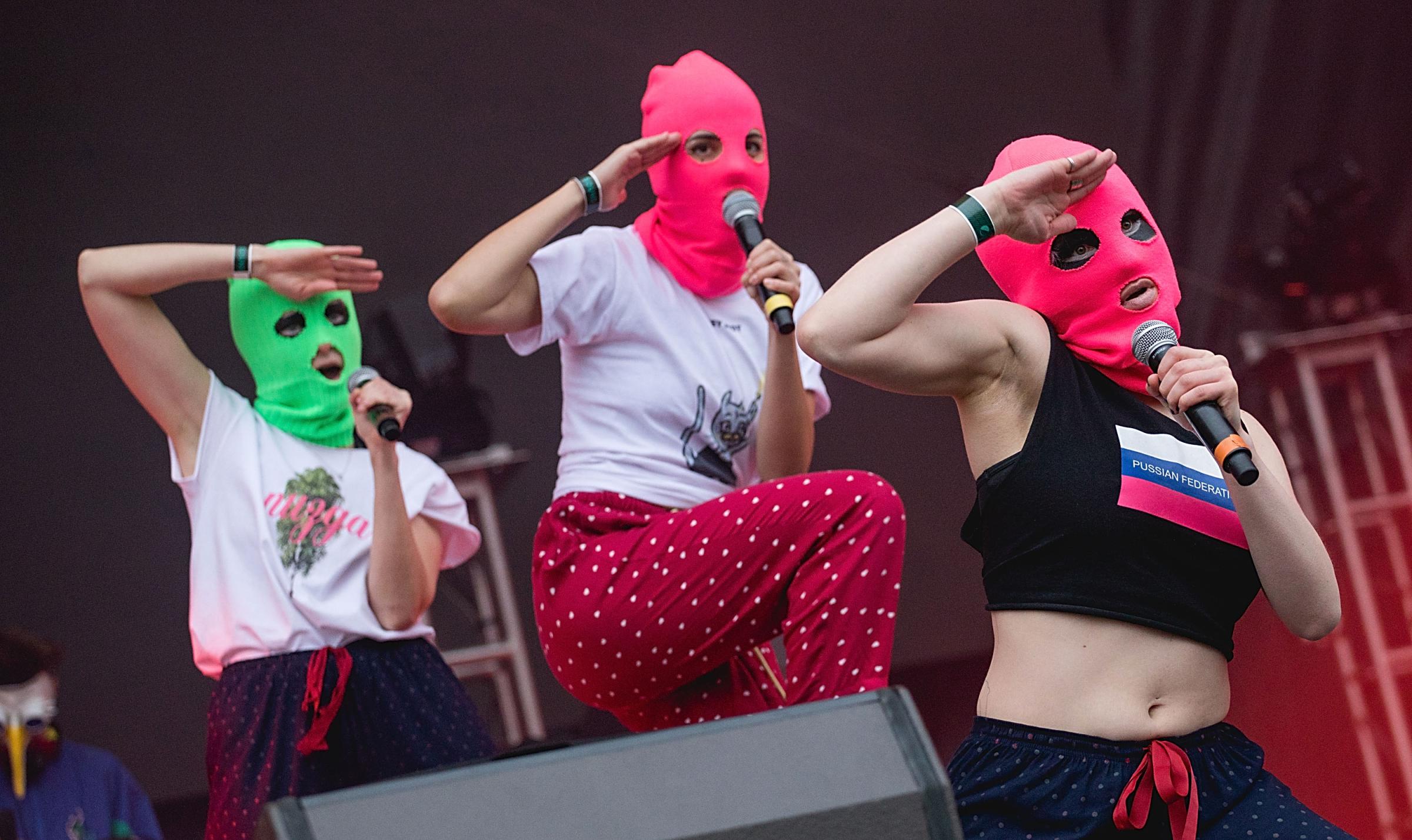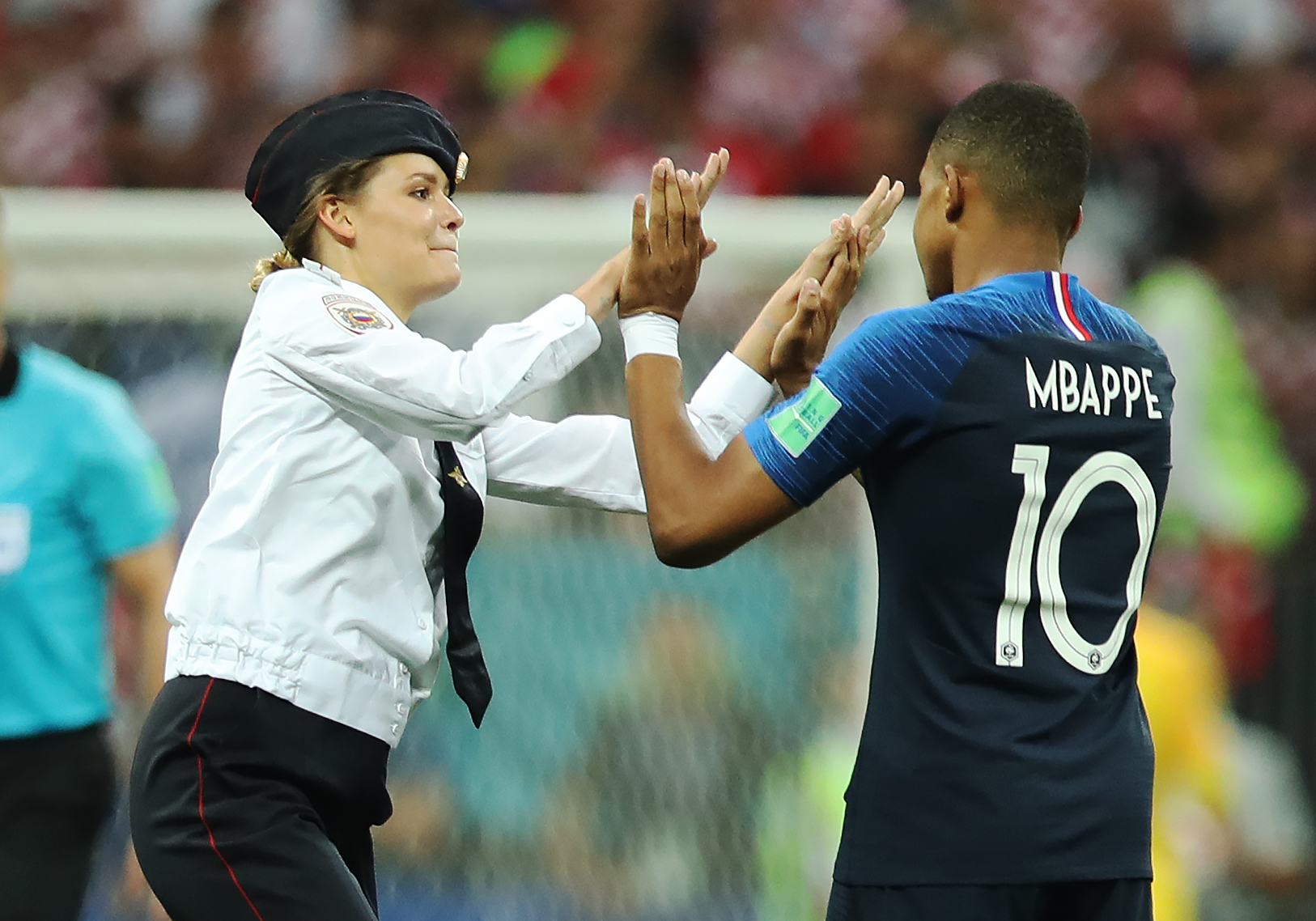The world’s attention was on Russia this summer for the FIFA World Cup, and Olga Kyrachyova and Veronika Nikulshina thought it no better time to stage a public protest against unlawful arrests and police violence in the country. Along with two other fellow members of Russian punk activist group and band Pussy Riot, the pair chose the biggest stage possible: the hotly anticipated showdown of the Croatia v France final.
Images of 31-year-old Kyrachyova and 21-year-old Nikulshina storming the soccer pitch dressed as police officers and high-fiving French football star Kylian Mbappé went viral, while the interruption of the match incurred the wrath of other footballers, fans worldwide and the Russian authorities, who immediately detained all four activists for fifteen days. But the action drew attention to Pussy Riot’s demands, which were released online as a manifesto urging the Russian government to allow political competition, to free political prisoners and to stop detentions at political rallies.
It’s not the first Pussy Riot stunt to capture international attention and result in arrests of the group’s activists. In 2012, the collective protested inside Moscow’s biggest cathedral, resulting almost two-year-long prison sentences for two members. TIME caught up with Kyrachyova and Nikulshina, known as Ola and Nika, about using art as activism, the recent suspected poisoning of fellow Pussy Riot member Pyotr Verzilov and life in Russia under Vladimir Putin as they prepared to speak at Miles of Love, an LGBT+ advocacy event at Hong Kong’s Eaton HK hotel.
How have the challenges facing you changed in the years since the group was founded in 2011?
Nikulshina: The communications between the government and political activists is kind of a game. You do something, the government does something: it’s like playing chess. For me, every game makes sense when it’s fair. But, as we know, seeing things like detention for no reason and poisonings, we can say definitely that the government uses forms that are unfair. That is the hardest thing for me to deal with.
Kyrachyova: Sometimes it’s really difficult to be inside of this unfair game. We had some hope in 2011, and in the beginning of 2012, as there were a lot of political protests. We really felt there was a mass of people standing together against unfair elections, but now, [the political environment] is becoming worse and worse.
What would you say have been the main triumphs and successes of Pussy Riot?
N: I think the main success of Pussy Riot is just that it exists. No matter what is going on, it still exists. We got through all of this shit and the fact that we are still here and we are still fighting — for me, this is the biggest success.
K: I would say that it’s really great that people started talking and discussing [after some of Pussy Riot’s actions]. It’s the main goal of art to make people think.
What is the relative importance of music and art in your activism?
N: Pussy Riot is not just about music. First of all, we are political activists, and first of all, for me, I am an artist. If it’s singing, if it’s acting, if it’s running in the football field, it doesn’t matter — it’s not about music. It’s about art, it’s about the message that we want to bring to the world. It’s a very big team of people who are enthusiastic, energetic and people who are fighters. We do whatever we can do under the political regime in Russia, we find the best way to influence things and the best arena to show the things that go on in Russia.

This summer, you both gained international coverage and attention for running onto the field of the World Cup final match. What was your main ambition of the protest, and how did you go about planning it?
N: We did this action because of the reasons outlined in our manifesto, like wanting the freedom of political activists. This summer, there was not a better place to get attention than at the FIFA World Cup. I’m proud of how quickly we prepared the action, because we didn’t have much time and the conditions were difficult — there were 12 heads of government in there [the stadium] and the level of security really had to be very high.
K: We were very well prepared — we expected to have a lot of difficulties and actually we were afraid of being stopped. We thought about lots of different situations.
How did you feel with the world’s attention on you? Do you think the protest achieved what you wanted it to?
K: It was about 30 – 40 seconds of total happiness. I was just trying to run, but I was thinking wow, we made it!
N: Running on the football field was probably one of the best moments of my life. When I stepped out onto the field and I looked up, the sky was dark and it was starting to rain. I realized at that moment that we were doing the impossible at the FIFA World Cup final with so many people sitting there, especially with Vladimir Putin watching us. It was amazing. In terms of whether it achieved what we wanted it to, if you’re asking whether the government met all of the [demands] we were asking for, then of course not. It does not work like that unfortunately. But, one of the main aims of actions like this is to grab a lot of attention. I think we managed it very well, because during the World Cup, a lot of foreigners came to Russia and thought how wonderful it seemed, and how great and friendly the police officers are. Actually, it is not like that.
For the football fans saying that we ruined the field and ruined the game, maybe it is bad. But for us, it’s totally not right to separate politics from FIFA and World Cup Final. It’s all about politics, it’s all about country. If we hadn’t stopped the game, the message would not have been clear. We really wanted to show people that you can live your life, or you can play your own game, and at any time for no reason, the police will just ruin your life and do whatever they want — as we did to the field.
Could you tell us about the experience of being imprisoned after that action?
K: Before, I had been detained several times, but just for a few hours. This was my first time in a detention center, and staying through the night at the police station was not fun at all. We were re-arrested again immediately after leaving the detention center, and this was really awful because we didn’t know what was going on at all.
N: It was very hard to deal with it mentally because after 15 days, you are just waiting for that moment when you step out and you are free. You’re counting down the seconds until you can step outside. At that moment, I felt like I was in a bad flashback, and I wondered if they could do this again after 15 days, and again, and again, because sometimes there are these kinds of experiences in Russia.

Pussy Riot member Pyotr Verzilov was hospitalized in September in a critical condition. Berlin’s Charite Hospital, where Verzilov was being treated, said that it was “highly plausible” that he had been poisoned with a toxin attacking his nervous system. What exactly happened, why do you believe it happened, and what is the latest on his condition now?
N: On Sept. 11, he was poisoned. He lost his ability to move, to speak, to see. He was hospitalized, and then we moved to Berlin with him, where he was unconscious for some time. We were really afraid that he would not be Pyotr again. Right now, he still has some problems, but after all that had happened, he is in an okay condition.
To me, it is clear that he was poisoned by the Russian government, for all the activities that we are doing, for the activities that he is doing by himself and with Mediazona [the Russian alternative media outlet founded by Pussy Riot members Maria Alyokhina and Nadezhda Tolokonnikova, where Verzilov works as an editor] and the Central African Republic (CAR) investigation. It’s about unfair games also: if somebody does something you don’t like, you can’t just kill him, but that’s exactly what almost happened. But Pyotr is enthusiastic right now and he is looking forward to going to Russia to just continue his work.
You mention the CAR investigation. In August, three Russian journalists traveled there to investigate the activities of Russian mercenary groups and were killed. What is the status of this investigation now?
N: He is for sure going to pursue that investigation. The investigation for him was a personal thing: one of the journalists who was killed there, Alexander, was Pyotr’s close friend. I know for sure that he is going to keep fighting for this investigation.
What would you like people to know and to understand about the way of life and the political environment in Putin’s Russia today?
N: I will say that it’s not Putin’s Russia — it’s our Russia, for all the people who live there, who want it to be a better place. So everybody has to fight, and this is the only thing that all of us can do, because nobody lives outside of politics.
In previous songs, Pussy Riot has spoken out against President Trump. Do you think there are similarities between President Trump and Vladimir Putin?
N: Putin and Trump, both of them are a problem for…
K: …the world!
V: Yes, and also people actually elected Trump, not Putin — because everybody knows that elections in Russia are not fair. I did not believe that Trump could be a president, but it’s kind of a clown’s show that he is head of the government. In one sense, they are kind of similar. Trump is trying to separate people from each other, and trying to create borders. All of Russia is about borders, and a democratic community cannot be like that.
Despite these challenges, what gives you hope about the future?
N: Everything that we do is about punk, and I love punk so much. What happens, despite some awful things, is that it is a big party — this gives us lots of hope.
K: The very clear values of freedom, love, and feeling international solidarity. I really believe in this younger generation in Russia, the U.S., Hong Kong and elsewhere, and I really believe that these young people are somehow connected throughout the world.
This interview has been edited and condensed for clarity. Reporting and video by Aria Chen/Hong Kong
More Must-Reads from TIME
- Cybersecurity Experts Are Sounding the Alarm on DOGE
- Meet the 2025 Women of the Year
- The Harsh Truth About Disability Inclusion
- Why Do More Young Adults Have Cancer?
- Colman Domingo Leads With Radical Love
- How to Get Better at Doing Things Alone
- Michelle Zauner Stares Down the Darkness
Contact us at letters@time.com